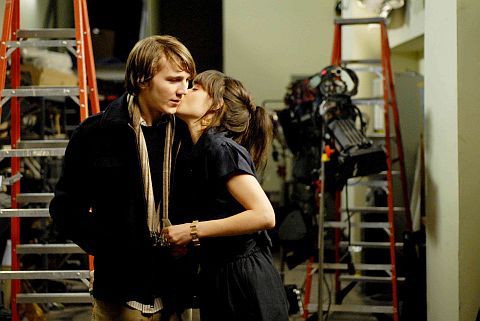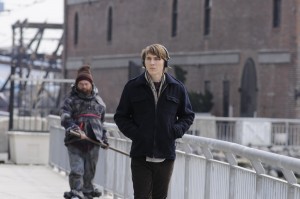We all know the story. A quirky young man feels disjointed from the life he lives in, and meets a quirky young woman who feels the same. Despite their obvious differences, they find themselves drawn to one another over and over until they either a) end the film with no hope for a relationship but with a sense of bittersweet reconciliation, or b) end the film with the sense that they are fated to be together, but with minimal smiling. It is this predictability that has led numerous critics to write off many indie movies, including Gigantic, which they claim relies so heavily on the indie trope of quirkiness that its eccentricities and alienated characters end up alienating the audience itself. In many ways, they are right. Gigantic certainly fits the bill of the indie checklist. Strange, quiet, young male protagonist with random talents and an inability to connect to those who should be loved ones? Check. Experimental drug use? Check. Odd family relationships? Check. Despite its over-qualification for joining the ranks of other indie classics, Gigantic’s characters are to most Americans surface-level interesting at best, and many of the film’s idiosyncrasies come off as arbitrary, engineered in a systematic but clumsy attempt to clone indie archetypes. In order to enjoy this film, the audience must pay close attention to subtleties beneath its predictable surface plot and think analytically, which presents a problem for many Americans, who are either incapable or unwilling to do so.

Gigantic notably stars Paul Dano, Zooey Deschanel, and John Goodman, whose names alone are enough to pique the interest of any indielover. Dano plays warehouse mattress salesman Brian Weathersby, whose greatest aspiration is to adopt a baby from China. After he sells a high-priced mattress to loudmouth businessman Al Lolly (Goodman), he meets Harriet Lolly (Deschanel), whose goofy nickname, Happy, was belittled by many movie critics. Brian and Happy share a sexual but not an emotional connection, though they ought to be able to commiserate in their disconnectedness to their equally dysfunctional families.
Despite the script’s provisions for glimmers of personality, the characters’ joylessness glosses them over, causing what may have been intended as dry humor to more closely resemble stoicism. Events that would in most people cause mirth, fear, or melancholy only register as blips on Brian’s and Happy’s emotional radar. Skinny-dipping, hallucinogenic mushrooms, and being stalked and violently targeted by a homeless man (uncredited: Zach Galifianakis) do not produce laughter, a zen experience, or terror, respectively. Even when Brian gets his Chinese baby, her coos elicit no more from him than a wan smile.
 Because many Americans may have a hard time maintaining interest in Gigantic’s zombie-like characters, they must watch the film more consciously than most box-office winners. It takes money to make movies, and every little detail, haphazard as it may seem, cost the producers. Therefore, unless the producers are prone to fiscal irresponsibility, the little oddities that seem careless to an unthinking audience must have some significance. When it was revealed that the homeless man that stalks Brian throughout the film was a figment of his imagination, many people accused Gigantic of having a gigantic hole in its story—after all, when the homeless man shot at him earlier in the movie, Brian’s father and brothers heard it. The audience ought to consider what this alleged hole could mean psychologically for Brian. Does he represent Brian’s inner torment, and can his family see his struggle? Big and perhaps unanswerable questions lurk in every nook and cranny of this film. Brian’s friend who works in a lab aims to quantify rats’ helplessness when placed in a life-or-death situation, such as drowning. Who is a rat in this movie, and can sadness really be measured? And the biggest question of all—what is so “gigantic” about this film? Not the storyline, nor the characters’ personalities, nor the setting, nor the baby Brian finally gets in the end—so what is it? Perhaps it is the bigger questions that the movie asks, those heavy questions that all too often get sidestepped or shrouded in the quotidian details of living. Gigantic by no means answers those questions, but if the you are willing to pay attention, it may just remind you that those questions are there. America needs to get out of its Pavlovian cinema rut and start thinking again.
Because many Americans may have a hard time maintaining interest in Gigantic’s zombie-like characters, they must watch the film more consciously than most box-office winners. It takes money to make movies, and every little detail, haphazard as it may seem, cost the producers. Therefore, unless the producers are prone to fiscal irresponsibility, the little oddities that seem careless to an unthinking audience must have some significance. When it was revealed that the homeless man that stalks Brian throughout the film was a figment of his imagination, many people accused Gigantic of having a gigantic hole in its story—after all, when the homeless man shot at him earlier in the movie, Brian’s father and brothers heard it. The audience ought to consider what this alleged hole could mean psychologically for Brian. Does he represent Brian’s inner torment, and can his family see his struggle? Big and perhaps unanswerable questions lurk in every nook and cranny of this film. Brian’s friend who works in a lab aims to quantify rats’ helplessness when placed in a life-or-death situation, such as drowning. Who is a rat in this movie, and can sadness really be measured? And the biggest question of all—what is so “gigantic” about this film? Not the storyline, nor the characters’ personalities, nor the setting, nor the baby Brian finally gets in the end—so what is it? Perhaps it is the bigger questions that the movie asks, those heavy questions that all too often get sidestepped or shrouded in the quotidian details of living. Gigantic by no means answers those questions, but if the you are willing to pay attention, it may just remind you that those questions are there. America needs to get out of its Pavlovian cinema rut and start thinking again.


Emily, your write-up of Gigantic illustrates what I love about films: two people can watch the same film and see very different things. Films have the capacity to create dialogue and inspire thought.
I might be wrong, but I kind-of felt like it was a direct response to my own review of the film, which, if that’s the case – bring it on sister! What I disliked about your write-up is that it implies that if you didn’t like the film you weren’t paying attention or you didn’t get it. I watched the movie very carefully, twice actually, with a pen and paper and I do when reviewing a film. I didn’t immediately sit down right to write, but thought carefully for a few days about the film, before I set pen to paper (er, fingers to keyboard). I understood the film, but simply did not see what you saw – I didn’t see subtly – I saw clunky ideas being thrown at the viewer. I saw was a promising film made by two enthusiastic filmmakers that got derailed by too many ideas and characters. The film need the refinement that often comes with experience. I am curious to see what their next film will offer.
To suggest that because there was money and effort behind this film automatically makes it thoughtful and careful would then suggest that every movie ever made would also be thoughtful and careful. In fact some of the most expensive movies are often the worst. I doubt any writer, filmmaker, producer goes into a project thinking: I want to make a shitty film that no one will like. Sometimes despite best efforts movies just aren’t successful.
I didn’t like this film because I didn’t think it was successful. But these are my definitions of what makes a film successful. I watch movies for three reasons: to be moved, to be provoked, to be entertained. If it doesn’t hit one of the three, its a flop. Everyone watches differently and for different reasons. I would suggest, perhaps, next time to review the film not the watcher.